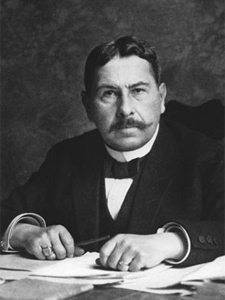 W
WPeople killed during the Night of the Long Knives – the Nazi purge in which Hitler and the Nazi regime used the Schutzstaffel (SS) to deal with the problem of Ernst Röhm and his Sturmabteilung (SA) brownshirts, as well as past opponents of the party – numbered at least 85 people murdered. It took place in Germany between June 30 and July 2, 1934.
 W
WCarl Fedor Eduard Herbert von Bose was head of the press division of the Vice Chancellery (Reichsvizekanzlei) in Germany under Vice Chancellor Franz von Papen. A conservative opponent of the Nazi regime, Bose was murdered during the Night of the Long Knives in the summer of 1934.
 W
WFerdinand von Bredow was a German Generalmajor and former head of the Abwehr in the Reich Defence Ministry (Reichswehrministerium) and deputy defence minister in Kurt von Schleicher's short-lived cabinet . He was promoted to captain in November 1918 and saw active service in the First World War. Bredow was among Schleicher's closest associates, being described by the British military historian John Wheeler-Bennett as a man "blindly devoted" to Schleicher. Wheeler-Bennett lived in Berlin between 1927 and 1934 and, as a man well connected to the German ruling class, knew Schleicher and his followers well. Schleicher appointed Bredow as his successor as head of the Ministerial Office in the Defence Ministry, which was the Reichswehr's favorite instrument for exerting influence on politics.
 W
WTheodor Duesterberg was a leader of Der Stahlhelm in Germany prior to the Nazi seizure of power.
 W
WKarl Ernst was an SA-Gruppenführer who, in early 1933, was the SA leader in Berlin. Before joining the Nazi Party he had been a hotel bellboy and a bouncer at a gay nightclub.
Carl Albert Fritz Michael Gerlich was a German journalist and historian, and one of the main journalistic resistors of Adolf Hitler. He was arrested, later killed and cremated at the Dachau concentration camp.
 W
WEdmund Heines was a German Nazi politician and deputy commander of the Sturmabteilung (SA).
 W
WEdgar Julius Jung was a German lawyer born in Ludwigshafen in the Kingdom of Bavaria.
 W
WGustav Ritter von Kahr was a German right-wing politician, active in the state of Bavaria. He helped turn post World War I Bavaria into Germany's center of radical-nationalism, but was then instrumental in the collapse and suppression of Adolf Hitler's Beer Hall Putsch in 1923. In revenge for the latter, he was murdered later in the 1934 Night of the Long Knives.
 W
WErich Klausener was a German Catholic politician who was killed in the "Night of the Long Knives", a purge that took place in Nazi Germany from 30 June to 2 July 1934, when the Nazi regime carried out a series of political murders.
 W
WAdalbert Probst was a Catholic Youth leader in Germany during Nazi period. He was killed during Hitler's 1934 Night of the Long Knives purge. Probst was national director of the Catholic Youth Sports Association. The Catholic Church in Germany had resisted attempts by the new Nazi Government to close its youth organisations. Probst, along with Erich Klausener and Fritz Gerlich were among the high-profile Catholic opposition figures targeted for assassination in the Night of the Long Knives of the summer of 1934, an early effort by Hitler to assert his dominance of German politics through violence. Probst was abducted and later found dead, allegedly "shot while trying to escape".
 W
WErnst Julius Günther Röhm was a German military officer and an early member of the Nazi Party. As one of the members of its predecessor, the German Workers' Party, he was a close friend and early ally of Adolf Hitler and a co-founder of the Sturmabteilung, the Nazi Party's militia, and later was its commander. By 1934, the German Army feared the SA's influence and Hitler had come to see Röhm as a potential rival, so he was executed during the Night of the Long Knives.
 W
WKurt Ferdinand Friedrich Hermann von Schleicher was a German general and the last Chancellor of Germany during the Weimar Republic. A rival for power with Adolf Hitler, Schleicher was murdered by Hitler's SS during the Night of the Long Knives in 1934.
 W
WWilhelm Eduard Schmid, better known as Willi Schmid, was a German music critic, and an accidental victim of the Night of the Long Knives in a case of mistaken identity.
 W
WEmil Sembach was an SS-Oberführer attached to the SS headquarters of Silesia.
 W
WBernhard Stempfle was a Jesuit priest and journalist. He helped Adolf Hitler in the writing of Mein Kampf. He was murdered in the Night of the Long Knives.
 W
WGregor Strasser was an early prominent German Nazi official and politician who was murdered during the Night of the Long Knives in 1934. Born in 1892 in Bavaria, Strasser served in World War I in an artillery regiment, rising to the rank of first lieutenant. He joined the Nazi Party (NSDAP) in 1920 and quickly became an influential and important figure. In 1923, he took part in the abortive Beer Hall Putsch in Munich and was imprisoned, but released early for political reasons. Strasser joined a revived NSDAP in 1925 and once again established himself as a powerful and dominant member, hugely increasing the party's membership and reputation in northern Germany. Personal and political conflicts with Adolf Hitler led to his death in 1934 during the Night of the Long Knives.